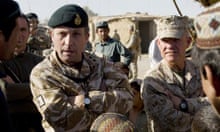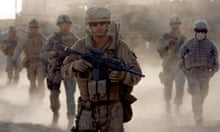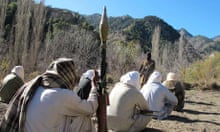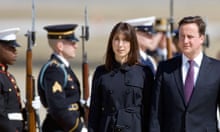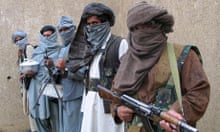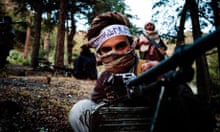A secret US military report says the Taliban, heavily backed by Pakistan, are confident they can win the Afghanistan conflict, and that they are gaining popular support at the expense of the Kabul government.
The report, The State of the Taliban 2012, is the latest of a series drawn up by a US special operations taskforce on the basis of interrogations with 4,000 suspected Taliban and al-Qaida detainees.
Its conclusions, that the Taliban's strength and morale are largely intact despite the Nato military surge, and that significant numbers of Afghan government soldiers are defecting to them, are in stark contrast to Nato's far more bullish official line, that the insurgent movement has been severely damaged and demoralised.
The report, leaked to the BBC and The Times, also portrays the Taliban as being under the thumb of Pakistan's powerful security agency, the Inter-Services Intelligence (ISI), but resenting that control.
According to published excerpts, the report finds that "Taliban commanders, along with rank and file members, increasingly believe their control of Afghanistan is inevitable. Though the Taliban suffered severely in 2011, its strength, motivation, funding and tactical proficiency remains intact."
The authors, American researchers attached to special forces, conclude that the weakness and venality of the government in Kabul is an increasing source of strength for the insurgents. "In the last year, there has been unprecedented interest, even from [Afghan government] members, in joining the insurgent cause. Afghan civilians frequently prefer Taliban governance over [the Afghan government], usually as a result of government corruption, ethnic bias and lack of connection with local religious and tribal leaders.
The BBC quotes the report as saying: "Reflections from detainees indicate that Pakistan's manipulation of Taliban senior leadership continues unabated. The Taliban themselves do not trust Pakistan, yet there is a widespread acceptance of the status quo in lieu of realistic alternatives."
The report also quotes a senior al-Qaida detainee as saying: "Pakistan knows everything. They control everything. I can't [expletive] on a tree in Kunar without them watching." He added: "The Taliban are not Islam. The Taliban are Islamabad."
Pakistan's foreign minister, Hina Rabbani Khar, rejected the report as "old wine in an even older bottle". Speaking during a visit to Kabul, Khar said her country had no hidden agenda and would back a peace process between Kabul and the Taliban as long as it was driven by Afghans and not outsiders. The Nato-led International Security Assistance Force (Isaf) played down the singificance of the report, pointing out it reflected only the views of captured Taliban fighters, who had their own agenda.
"Obviously they are telling us what their idea is about the goings on of their campaign," said Brigadier General Carsten Jacobson, the chief Isaf spokesman. "It is what they either do believe or what they want us to believe."
He said most of the captured fighters think "they are still having a successful role" on the ground but that perception was wrong and Nato was not planning to change its strategy because of it in any way.
"The insurgency is clearly on the back foot. We have been pressurising them over the summer, we have taken vast amounts of land out of their hands and we have detained a high number" of militants, Jacobson said.
The report is the latest of a series aimed at providing an assessment of the insurgency on the basis of detainee interrogations, written by researchers seconded to a US special operations unit called Task Force 3-10, which is charged with hunting down Taliban and al-Qaida commanders. An earlier version of the report was influential in convincing the British government at the time that a peace deal could be done with the Taliban.
Sherard Cowper-Coles, the former UK special envoy for Afghanistan and Pakistan, said of the document at the time: "It paints a picture of the Taliban believing that they are winning in the long war, in the long game, though they suffer tactical reverses.
"It shows that many of them are fed up with fighting; that some of them have suffered very painful losses. And it shows their real objection is to foreigners in their land, whether those foreigners come from Kansas or Karachi or Cairo. They are fighting as nationalists, and it does show that a deal could be done – but it doesn't show that a deal will be done."
The Taliban on Wednesday said they had no plans to hold peace talks with the Afghan government in Saudi Arabia, as President Hamid Karzai has proposed. A Taliban spokesman, Zabiullah Mujahid said that exploratory talks with the US would not lead to negotiations in Qatar as planned until there is "trust-building between the sides, which has not started yet". The Taliban are demanding the release of five of its senior members from Guantánamo Bay.
The Obama administration is considering the demand, but Karzai has blocked any deal on the grounds that it bypassed the sovereignty of his government.
The Associated Press quotes unnamed intelligence officials as saying the US was exploring a solution by which Afghanistan could assume a formal legal custody over the prisoners and then, with the prisoners' own consent, agree to consign them to house arrest in Qatar.
